1972 Topps #682 Mike McCormick SCARCE HIGH # (Giants)
| Grade |
NM/MINT |
| Book Value |
$ 15 |
| Our Price |
$ 23.95
Add to cart
|


Below are short bits & pieces on sportscard & baseball trading card collecting.
Please wander around the website for more info, prices, values & images
on vintage baseball, football, basketball, hockey, sport and non-sports cards.
1991 Cardboard Dreams Baseball Cards
Checklist & Values
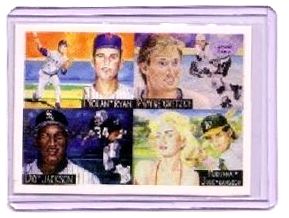

Neat oddball set with a very unusual mix of players.
A promotional lead-in for "Cardboard Dreams" a soon to be
sportscard magazine. Promo cards were given out at a few
regional baseball card shows mostly in So. Cal.
MLB filed lawsuits against similar magazines and the magazine was
cancelled before 1st issue leaving just a small run of promo
cards (limited to 5,000) and some scarce proofs.

SERIES 1 SERIES 2
#1 Willie Mays # 9 Mickey Mantle
#2 Nolan Ryan #10 Nolan Ryan & Sandy Koufax
#3 Tony Gwynn #11 Frank Thomas & David Justice
#4 Wayne Gretzky #12 Brett Hull
#5 Jose Canseco/Madonna #13 Ted Williams & Joe DiMaggio
#6 Ken Griffey Jr #14 Barry Sanders
#7 Bo Jackson #15 Dan Marino
#8 Michael Jordan #16 Magic Johnson & Larry Bird
Prototype #1: Nolan Ryan / Wayne Gretzky / Bo Jackson / Jose Canseco & Madonna
Prototype #2: Mickey Mantle / Nolan Ryan & Sandy Koufax
Ted Williams & Joe DiMaggio / David Justice & Frank Thomas
Click for complete
1991 Cardboard Dreams Baseball card listings
Note: You may be on that page now.
|

1956 Topps Football
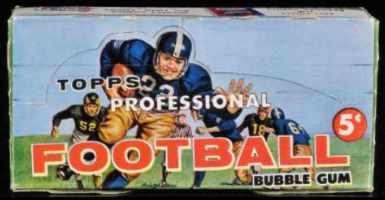
After they acquired Bowman, Topps issued its first NFL licensed
football set issuing (120) brightly colored cards.
Team cards were a nice new addition to the earlier Bowman offerings.
Also issued was a checklist and (5) special contest cards.
Most of these special cards were either tossed away or sent in
to win prizes making them quite difficult to find.
Like its early 1950's baseball issues, these cards
measured in at 2-5/8" x 3-3/4", sligtly larger than the regular
modern issued cards.
Each team had (9) player cards and the team card.
To make the number of cards work with the card-sheet size,
Topps printed all the cards twice on each sheet, EXCEPT the
Washington Redskins and Chicago Cardinals who were short
printed (single printed)and are more difficult to find.
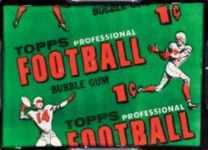
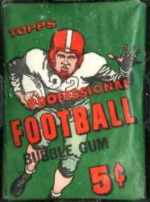 Top Rookies: Lenny Moore, Roosevelt Brown, Joe Schmidt, Bill George...
Top Rookies: Lenny Moore, Roosevelt Brown, Joe Schmidt, Bill George...
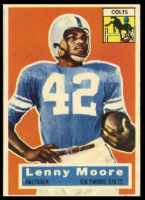
Click for complete
1956 Topps Football cards
Note: You may be on that page right now.
|

Authentic Major League SIGNED
Game-Used LINEUP Cards (PSA)
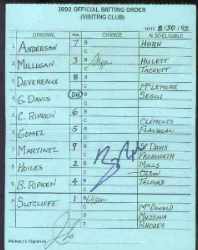
These are the official lineup cards SIGNED BY THE MANAGER & given
to the home plate umpire before the game with the team's line-up
& batting order !!! Making them even neater, often managers made
lineup changes on these cards throughout the game.
These official lineup cards were SIGNED BY THE MANAGER and presented
to the home plate umpire before the game. They detailed the team's lineup and
batting order. Managers often made lineup changes on these cards throughout
the game, making them even more unique.
Collectors say "They are official documents of a particular game, so they are
absolutely historically relevant. The manager, he was the general in the war.
Imagine owning Eisenhower's list of who he wanted to go into battle, and then he
signed it !!! Imagine what that would be worth?"
The first dugout lineup cards were seen around 1960. Along with lineup
cards, most ended up in the trash after games, making them quite rare today.
MLB saw the light and started marketing them directly in the 2000's.
Astronomical prices have been paid for cards from special games.
$165,010 for the Red Sox dugout lineup card from Game 4 of the 2004 World Series.
$138,000 in 2007 for 1st ever All-Star Game batting order cards.
$ 40,000 for batting order cards and the pen used to fill them out from
Cal Ripken's 2,130th & 2,131st games.
Click for complete
Major League SIGNED Game-Used LINEUP cards
Note: You may be on that page right now.
|

How long have sports cards been around ? (part 1)
The first baseball trading cards date back to 1869. For many years,
baseball cards were packaged in packs of tobacco as a way to increase sales
the same way that today prizes are packaged in boxes of cereal.
In the 1920's and 1930's, candy and gum companies started packaging baseball
cards in their products as well.
Baseball card production was virtually halted in the early 1940's due to paper
shortages created by World War II. The "Modern Era" of baseball cards began in
1948 when Bowman Gum Inc. offered one card and one piece of gum in a pack for a penny.
The first important football set was the Mayo set featuring college players
in 1984. Other than the 1935 National Chicle set no other key football set was
issued until 1948 when noth Bowman and Leaf produced sets.



 After they acquired Bowman, Topps issued its first NFL licensed
football set issuing (120) brightly colored cards.
Team cards were a nice new addition to the earlier Bowman offerings.
Also issued was a checklist and (5) special contest cards.
Most of these special cards were either tossed away or sent in
to win prizes making them quite difficult to find.
After they acquired Bowman, Topps issued its first NFL licensed
football set issuing (120) brightly colored cards.
Team cards were a nice new addition to the earlier Bowman offerings.
Also issued was a checklist and (5) special contest cards.
Most of these special cards were either tossed away or sent in
to win prizes making them quite difficult to find.



 Neat oddball set with a very unusual mix of players.
A promotional lead-in for "Cardboard Dreams" a soon to be
sportscard magazine. Promo cards were given out at a few
regional baseball card shows mostly in So. Cal.
Neat oddball set with a very unusual mix of players.
A promotional lead-in for "Cardboard Dreams" a soon to be
sportscard magazine. Promo cards were given out at a few
regional baseball card shows mostly in So. Cal.


 Top Rookies: Lenny Moore, Roosevelt Brown, Joe Schmidt, Bill George...
Top Rookies: Lenny Moore, Roosevelt Brown, Joe Schmidt, Bill George...

 These are the official lineup cards SIGNED BY THE MANAGER & given
to the home plate umpire before the game with the team's line-up
& batting order !!! Making them even neater, often managers made
lineup changes on these cards throughout the game.
These official lineup cards were SIGNED BY THE MANAGER and presented
to the home plate umpire before the game. They detailed the team's lineup and
batting order. Managers often made lineup changes on these cards throughout
the game, making them even more unique.
These are the official lineup cards SIGNED BY THE MANAGER & given
to the home plate umpire before the game with the team's line-up
& batting order !!! Making them even neater, often managers made
lineup changes on these cards throughout the game.
These official lineup cards were SIGNED BY THE MANAGER and presented
to the home plate umpire before the game. They detailed the team's lineup and
batting order. Managers often made lineup changes on these cards throughout
the game, making them even more unique.
